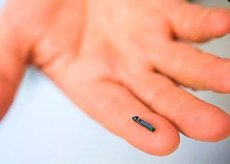New publications
An organic implant can help relieve severe pain
Last reviewed: 02.07.2025

All iLive content is medically reviewed or fact checked to ensure as much factual accuracy as possible.
We have strict sourcing guidelines and only link to reputable media sites, academic research institutions and, whenever possible, medically peer reviewed studies. Note that the numbers in parentheses ([1], [2], etc.) are clickable links to these studies.
If you feel that any of our content is inaccurate, out-of-date, or otherwise questionable, please select it and press Ctrl + Enter.

At Linkoping University in Sweden, a group of specialists has created a small device that effectively relieves pain. The unique device is based on organic electronics (i.e. using organic materials) and is implanted into the patient's body. The device reduces the sensitivity of nerve endings, helping to completely eliminate pain or significantly reduce the severity of its manifestation.
Linköping specialists have managed to create a device that sends special signals to the brain via neurotransmitters, as a result of which signals from nerve endings are blocked and sensitivity to pain is significantly reduced.
Experts have called the new device an "ion pump". The device does not have electrodes that need to be implanted into the patient's body, instead, the device is made of organic materials that are fully compatible at the biological level with the human body, the principle of operation of the device is based on the direction of chemical signals and has already been tested on laboratory rodents.
In the experimental group of mice, which were implanted with a prototype model of the ion pump, scientists noted that the development has the right to the future. The device was implanted in the spinal cord of the rodents, it did not constrain the animals' movements at all and did not cause them discomfort. As a result, scientists noted that the mice's pain sensitivity in certain parts of the body was completely turned off, while no side effects were observed.
Scientists suggest that in a few years such devices will become an integral part of modern medicine and will be used to relieve pain in patients with severe cases, it is likely that such a device will help with disorders such as epileptic seizures or Parkinson's disease.
Recently, American colleagues announced that they had discovered a simple and effective method for reducing pain. At Cornell University, specialists conducted an experiment in which patients from a Montreal hospital took part.
All volunteers were divided into four groups, and all participants underwent a simple operation under light anesthesia. In the first group, participants were allowed to play computer games during the operation, in the second - to communicate with friends or relatives by correspondence, in the third - to correspond with strangers, the fourth group was completely deprived of access to computers or smartphones.
As a result of observations, scientists found that computer games reduced sensitivity to pain by half compared to patients in the fourth group, but participants in the first group felt pain twice as sharply as participants in the second group, who were allowed to correspond with relatives and friends. Patients in the third group, who corresponded with strangers, felt half as much pain compared to participants in the second group and six times less than participants in the fourth group. Scientists noted that the lowest level of pain was observed among patients in the third group, who communicated with strangers. According to experts, this is due to the fact that a person was distracted from what was happening and "forgot" about the pain, since he could not complain to a stranger, unlike the group that corresponded with friends or relatives.

 [
[